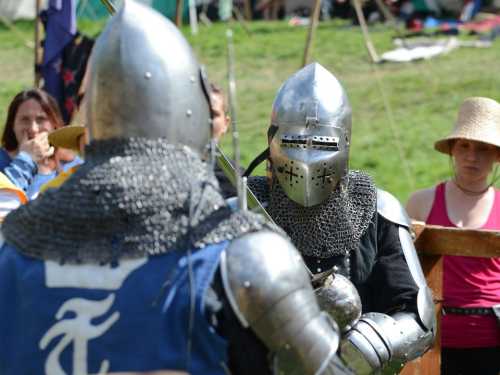
Our contemporaries like to say that “there are almost no knights left.” As if there is something bad in this. For some reason, the mass consciousness idealizes these people. In the imagination, they appear noble, the meaning of their life is to save beautiful ladies and kill thieves. The image, of course, is beautiful, but it has nothing to do with reality.
Knights were only representatives of a class that considered war a hereditary profession. It existed in various European countries for several centuries, so it is generally incorrect to speak of it as something unchanging and homogeneous.
Very often, knights were considered warriors who were part of the personal armies of local feudal lords. This meant, among other things, that during armed conflicts, which did not stop in Europe for many centuries, these people turned into bandits, terrorizing the local population and doing whatever they pleased.
There were no generally accepted, unified, and at least somewhat formalized codes of chivalry as such. However, over the centuries, certain ideals of behavior gradually developed under the influence of the Church, court culture, and literature. The rules that members of this class adhered to, especially in the early stages, were most often religious in nature and concerned the restraint of violence. They were intended to curb the worst aspects of the nature of armed men so that they would not kill or rob the weaker. And although later, with the development of courtly culture, elements of gallantry began to be added to the ideals of chivalry, initially these norms had nothing to do with such curtseys as “letting a lady go first.”
From the late 10th to the 13th century, the Catholic Church attempted to quell the violent tempers of Europeans with the doctrine of the “Peace of God.” It imposed religious sanctions for violence committed during Christian holidays or on certain days of the week. It is here that one can find the principles that guided rather large groups of “hereditary warriors.”
Let us take as an example the text of the oath of 1023, which has come down to us, proposed by Bishop Warin of Beauvais to King Robert II the Pious and his knights. The document gives a clear idea of what crimes these people most often committed and what punishments they were prepared to suffer in case of violation of the obligations they had undertaken. Let us recall only seven points of this unthinkable agreement in our “spiritless” times.
Do not attack clergy
The oath of Bishop Warin of Beauvais forbade knights from attacking unarmed priests, monks, and their companions, except in cases where they had broken the law or if the use of force was in retaliation for a crime that had not been atoned for within fifteen days.
Gunbald, Archbishop of Bordeaux, particularly condemned any knight who “attacks a priest, deacon, or any other member of the church hierarchy who is not armed with a shield, sword, mail, or helmet, and is in the street or at home.” Gunbald believed that the punishment for such a crime should not be a curse but excommunication—unless the knight atoned for his crime or unless it was proven that the victim had brought the violence upon himself.
Do not steal livestock or kill farm animals unnecessarily.
The oath forbade the killing of bulls, cows, pigs, sheep, lambs, goats, donkeys, mares, and stallions. It also limited the confiscation of animals to certain times of the year: “I will not take horses, foals, and mules grazing in the fields from the first of March until All Souls' Day (celebrated on November 2), unless they do me harm.”
The exception was when the cattle were necessary for the knight and his companions to eat. The aforementioned Gunbald of Bordeaux believed that violators of this point of the rules should be subjected to a church curse.
Do not attack random people, do not rob them, do not kidnap or torture them.
This rule would seem to be understandable to any normal person, but Bishop Warin considered it necessary to enshrine it in his oath. From this we can conclude that the knights treated peasants, commoners, merchants, pilgrims and other people who did not belong to the more privileged classes in a completely bestial manner.
Historical documents contain ample evidence that members of the lower classes were constantly victims of robbery, beatings, extortion, and kidnapping for ransom.
Do not burn or destroy houses without good reason.
The oath of Bishop Warin of Beauvais condemned senseless arsons. An exception was made if the knight discovered an “enemy or thief” in the building. Separately, the church hierarch condemned the robbery of the unfortunate, even if it was committed “at the treacherous instigation” of the feudal lord.
It is worth mentioning that people of that time were sincerely outraged by this arbitrariness. In particular, the French theologian and monk Alan of Lille wrote that the knights had reached the “highest degree of thievery”, providing themselves with money by robbing impoverished people.
Don't help criminals.
The same Alan Lilsky reported that the knights had a “cruel nature of marauders,” and they often became “leaders of gangs of robbers, cattle thieves.” Apparently, over time they developed a reputation as marginals, that is, people who, by their nature, are very close to the criminal world.
Therefore, it is not surprising that the bishop demanded that the knights not harbor criminals or help them. In the event of a medieval “criminal” seeking protection, the “noble warrior” was obliged to force him to atone for his guilt before society or the victims of his crimes (within fifteen days) or refuse his request.
Don't attack women without reason.
The oath forbade knights to attack noble women traveling without their husbands, as well as their companions. In addition, widows and nuns were not allowed to be touched. However, with those representatives of the weaker sex who committed crimes against a knight, they could do, as they now say, at their own discretion.
Do not ambush unarmed knights.
As already mentioned, the doctrine of “God's Peace” sought to reduce the amount of violence that was being committed around by limiting the times when it was permitted to be resorted to.
The decree of Emperor Henry IV from 1085 stated, in particular, that peace should be observed on Thursday, Friday, Saturday and Sunday, during the apostolic feasts, from the ninth Sunday before Easter to the eighth day after Pentecost, etc.
It is therefore not surprising that the oath of Bishop Warin of Beauvais forbade knights from attacking unarmed comrades “from the beginning of Lent until the end of Easter.” Today this seems extremely absurd, but in those cruel times it was a great step towards the humanization of society.





